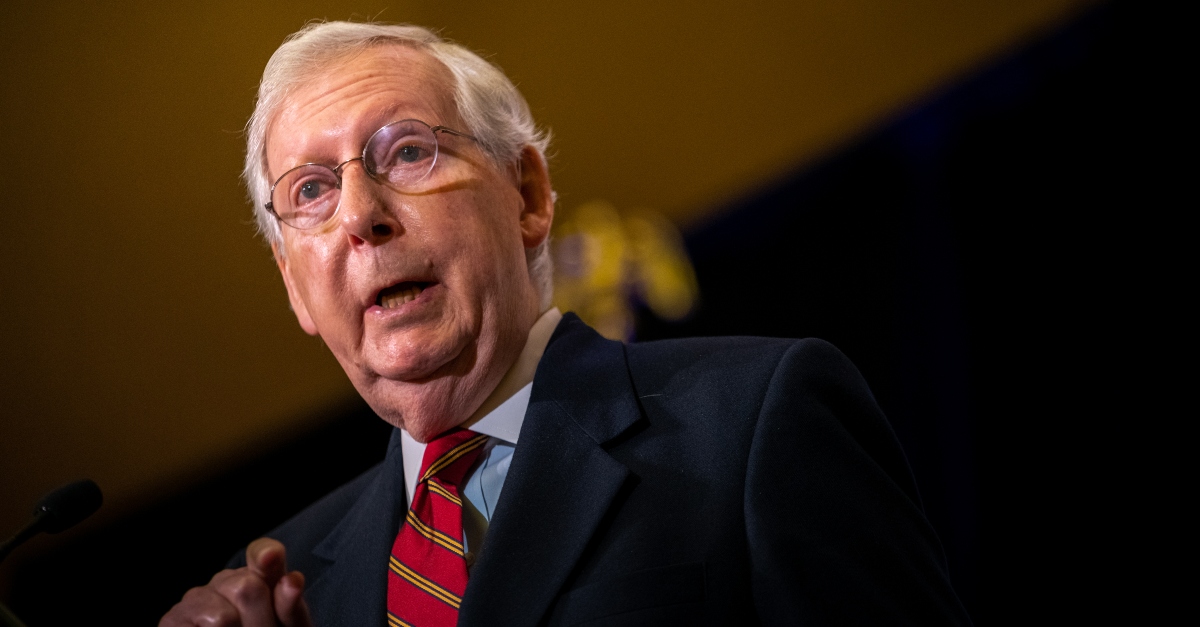
Senate Minority Leader Mitch McConnell (R-Ky.) on Saturday announced his intention to acquit former president Donald Trump of inciting insurrection. Commentary was mixed.
“I believe Mitch started off wanting to see Trump convicted – to remove him from the equation in future election cycles – but is too unpopular within his own party to forge a consensus around that position and didn’t want to be a Romney or Cheney figure,” Obama administration Justice Department alum and current executive director of Demand Justice, a left-of-center judicial advocacy group, Brian Fallon tweeted.
That political concern, however, is not what the nation’s most powerful Republican actually said his vote would be based upon. McConnell released a statement to fellow Republican senators saying the decision was premised on concerns about the U.S. Senate’s jurisdiction to convict an ex-president no longer in office.
“While a close call, I am persuaded that impeachments are a tool primarily of removal and we therefore lack jurisdiction,” the Kentucky Republican wrote in an email. “The Constitution makes perfectly clear that presidential criminal misconduct while in office can be prosecuted after the president has left office, which in my view alleviates the otherwise troubling ‘January exception’ argument raised by the House. Given these conclusion, I will vote to acquit.”
McConnell, of course, personally foreclosed against a quick impeachment tribunal for the 45th president—one that could have occurred while Trump was still in office. On Jan. 13, then-senate minority leader Chuck Schumer (D-N.Y.) formally requested that the Senate be called back from recess in order to begin the impeachment proceedings. McConnell refused that request; the Senate was kept out of session until its next-scheduled day of business, Jan. 19—the day before Trump left office. Democrats did not gain control of the upper chamber until the day after that when Vice President Kamala Harris swore in three new Democratic Party electees.
Critics noted that the Bluegrass State GOP leader’s foot-dragging was the direct cause of the jurisdiction argument even being on the table.
“McConnell apparently says there’s ‘no jurisdiction’ for the Senate to convict a president who is no longer in office,” tweeted University of Kentucky College of Law Professor Josh Douglas. “Of course, McConnell refused to convene the Senate in the last week of Trump’s term so the trial could begin.”
Much hay was made by the media and political establishment after McConnell dangled the possibility of holding Trump accountable for the Jan. 6 Capitol Hill siege by pro-Trump rioters.
“The mob was fed lies,” McConnell said on the floor of the Senate on Jan. 19. “They were provoked by the president and other powerful people.”
While that apparent switcheroo quickly made news on Saturday, some observers were sanguine about McConnell’s ultimate telegraphed intention to acquit Trump.
Virginia-based human rights lawyer Qasim Rashid offered a representative take. He said the email to GOP senators was evidence of McConnell’s “predictable hypocrisy” and suggested that the move did not augur well for President Joe Biden‘s agenda in the Senate.
“Once a craven political tactician, always a craven political tactician,” national security attorney Bradley P. Moss mused in an email to Law&Crime.
Almost immediately after McConnell made that announcement, the Senate voted 55-45 to call witnesses—shelving plans to vote on Trump’s guilt or innocence later on Saturday. The proceedings continue to develop as of the time of this writing.
[image via Jon Cherry/Getty Images]
Have a tip we should know? [email protected]